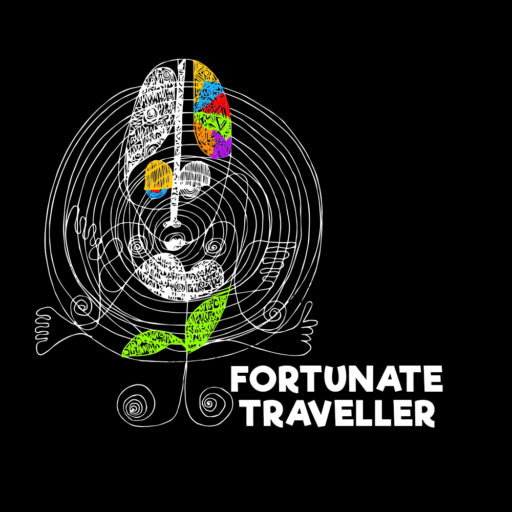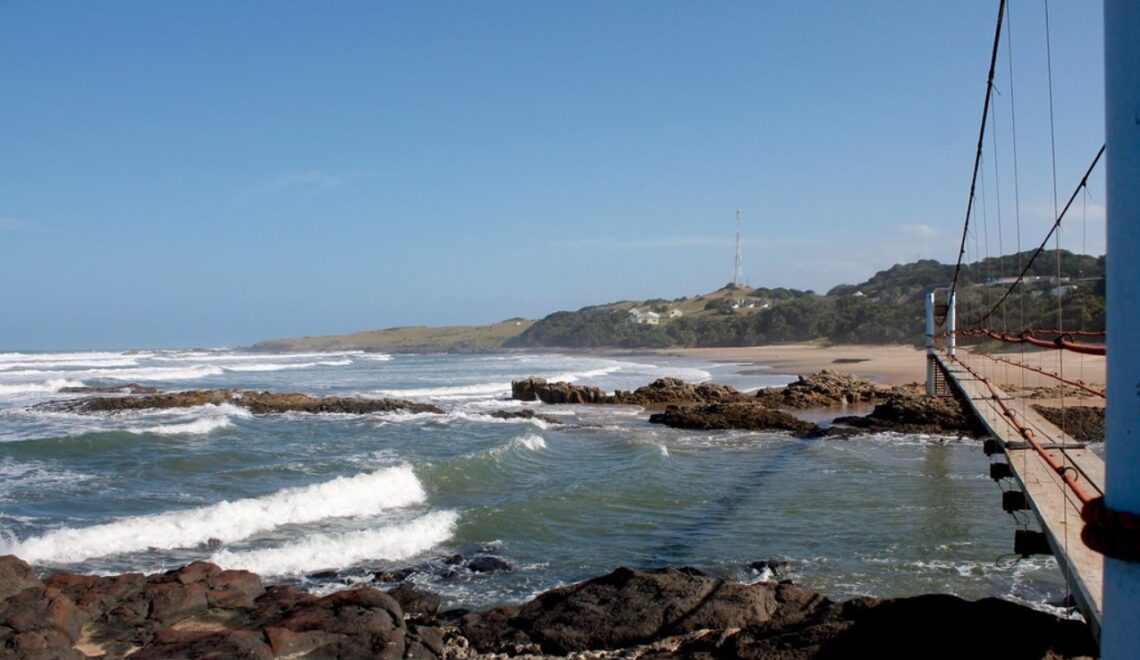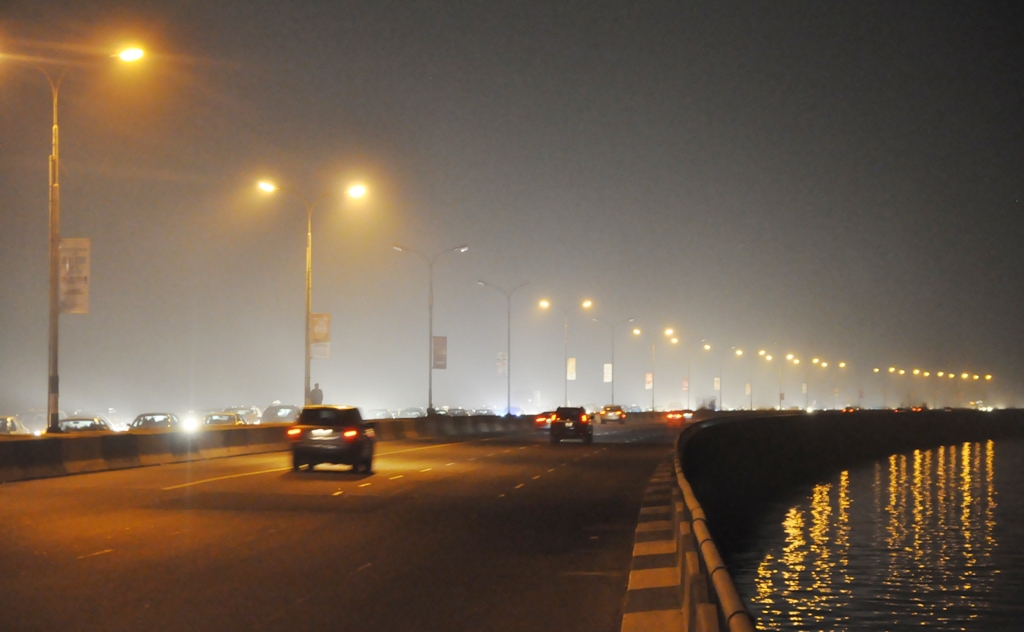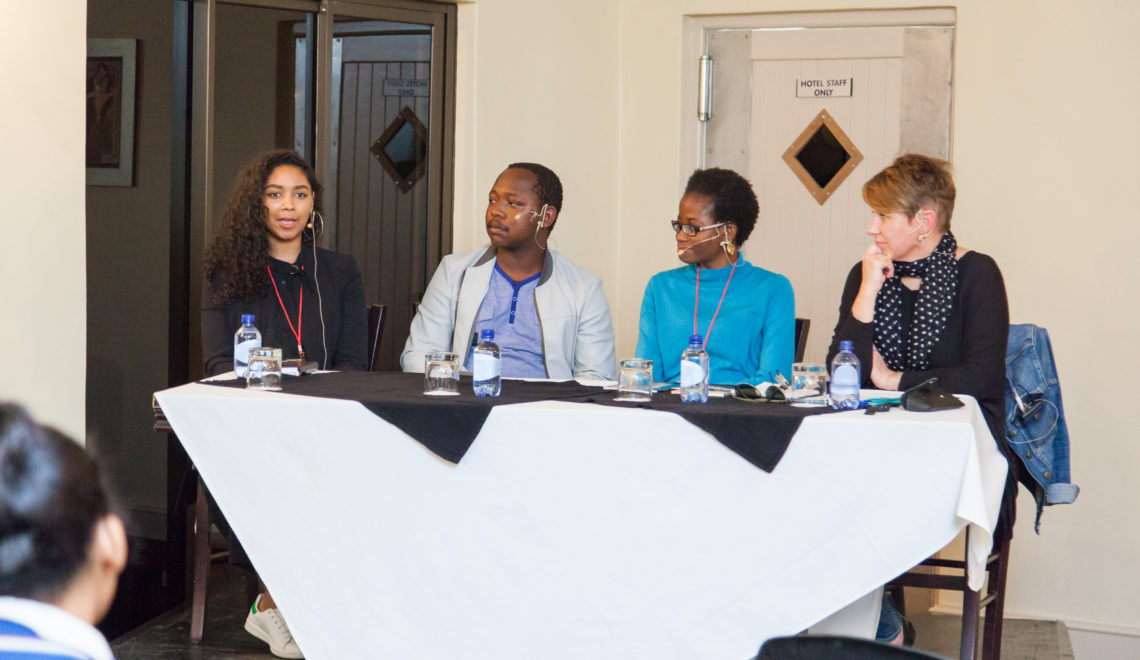
Of dreams on wings…
My toddler daughter loves butterflies. She says aeroplanes are iron butterflies and I do not fault the logic. I think of it at the airport as I wait for my flight to be announced; is the butterfly’s transformation a metaphor for the aeroplane advancing dreams from one state to another? I’m waiting for a metamorphosis into the one who writes a dream, and so I let her view inspire me to believe in the stronger connection between the aeroplanes, gliding on and off the runway and the fluttering wings of a butterfly on a flower as it prepares to take flight.
Later, when I sit on the plane taking me to South Africa for a series of literary events planned for the Goethe Institut by the curator, Indra Wussow, I am not thinking of butterflies, I’m thankful.
As the inflight announcement is being made, I think of how a few hours earlier, my car had been in an accident that didn’t end up fatal. I look at the photo on my phone: the broken headlamps and dented sides of the car recall flashes of a skidding motorcycle, a curvaceous woman doing a flip over the car and a spindly motorcyclist performing an impulsive dive across the road, while we the three occupants in the car watch in fear, as shock turns us into mannequins, hoping the scene would not end as the unveiling of a tragedy that would ruin our future. The victims of the accident, thankfully, had only a few bruises.
I look at the photograph again, say a little prayer of thanks to God, make a mental note to follow-up on the ‘survivors’ and move my thoughts into transformations – I think about flying away, away in an iron butterfly to South Africa.
Small talks in Cape Town
My plane taxis down the runway in Cape Town and I tuck away every of my last hours’ memories into future poems, essays, conversations and short stories.
I walk out of arrivals and wait for the driver who is expected to pick me up at the airport. The moving throng of faces – anxious, excited, some hopeful – looking everywhere for family, friends or just adventure walk past me – hurriedly, sluggishly, happily – while I search around for a card among the many searching eyes and strained arms around me waiting to be claimed as a recognisable identity. Among the many cards flashing before my face, the eyes asking questions if I am the one they seek, none bears the name: JUMOKE VERISSIMO or FRANSCHHOEK LITERARY FESTIVAL.
I walk into the taxi park, where the face of a man full of smiles, which I almost take for my host’s, ask if I need a ride into town. I explain I’m trying to get across to my host.
‘Try and you call them? Do you have their number? You’ll need a SIM card…. Maybe you should even buy it in town… ok… no-no. It’s fine. Use my phone. Ok? Ok.’ A few minutes later, I am talking to Sine, my contact at Goethe Institut in South Africa.
‘Oh… it was a mix-up… so sorry… it’s nothing… coming soon… go to the taxi stand… we learnt your flight was delayed…. don’t worry… someone will take you to Franschhoek. Ok? Ok.’
The town Franschhoek is a finished painting
I meet Franschhoek without judgement. It is a jarring quiet from the suburb I stay in Lagos. The small town with several vineyards is also a paradisiacal trail of greens and hills, dotted with a few Victorian buildings. The wine land mountains are like a backdrop curtain to the town.
My guest house is Centre-Ville. The décor is maintained in its vintage form. Yet, it carries a strong presence of homeliness. I wonder for a moment what life was here during slavery and during apartheid. It stands, a white edifice, narrating the story of an untainted accomplice in the over 100-year-old proper architecture. The house is managed by Jaco and Elsa Naude.
You can smell home-made food as you walk in. Elsa welcomes me at the door, introduces me to her assistant, and talks about meeting Jaco later while I savour the lingering aftertaste of elegance which would stay with me when I’ll depart from the Guest House – I step in and out of it, thinking only of good wine.
Elsa then leads me into my room which has a shelf of books by its entrance. I make sure my book finds a company on the shelf. However, in that moment, I take a cursory look at the shelf as I move into the room, exhausted, taking in the four-poster bed, and the carved centre table with a gift bag from the festival. There’s a bottle of wine in it, and some other booties which are in another bag on the table.
***
The Franschhoek Literary Festival, my host wrote in an email, is one of the major literary festivals in South Africa. The streets have this anticipation, although there are no publicities and no adventure in the faces of those I see around. I do not know what to expect.
I walk down the road to The Town Hall, on Huguenot Street, where I am told I can get my lanyard and other festival identification. It is Marla I see first. I have been communicating with her over the previous weeks on the festival. She is busy. She and several others are making arrangements; hanging banners, cutting papers and doing all sort. I walk up to her. She recognises me and smiles. It is evident I have arrived earlier than others. Later on, at the informal welcome party at the Town Hall, I meet the other writers for the festival through quick introductions and finger descriptions of who-is-who.
With my lanyard hanging down my neck and a look of slow adaptation on my brow, the following days became a bustle of excitement. I could barely recognise the quiet town as writers and readers mingled from one panel to another.
The once empty streets are filling up; writers are standing around backslapping, laughing gaily on a porch in a house that has been dedicated as a meet-and-greet. Writers, artists, filmmakers, gather to make light talks after readings, and while eating sandwich or cake downed with a cup of juice I bump into a friend, Niq Mholongo in his trademarked hat and ready spring. ‘You’re coming to Jo’burg… right… right… see you… gotta go.’
I take some time to see Akin Omotoso’s film, Tell me something Sweet, before my first panel session begins. The film is an avant-garde perspective that reinvents the South African experience in a refreshingly new way. I wait to see him after the film, and we walk down afterwards to a beehive of writers at the Town Hall. I sit on the kerb just outside the Town Hall with Bongani Madondo, Palesa Mazamisa, Richard Poplak, Elaine Sacco and her son. I am introduced to other writers on the move.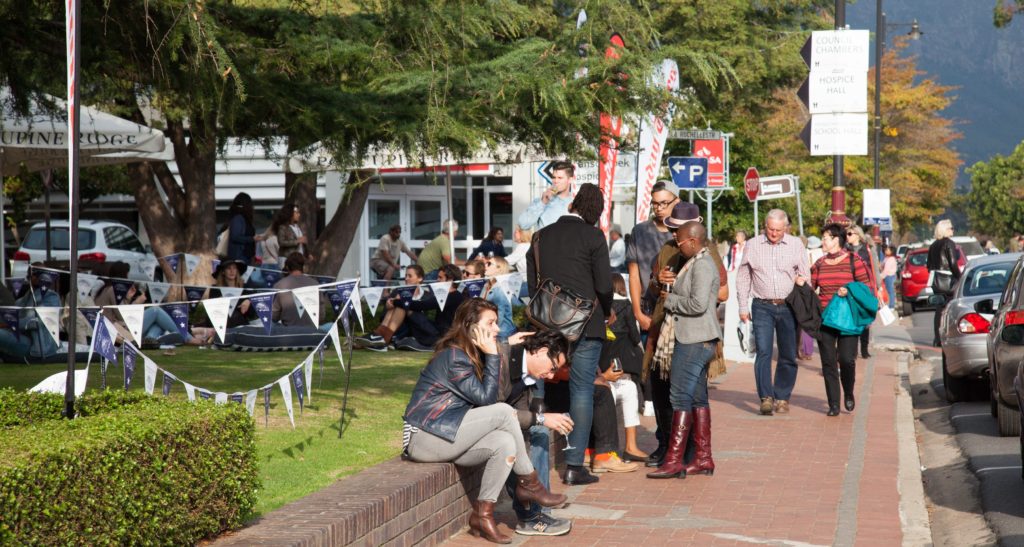
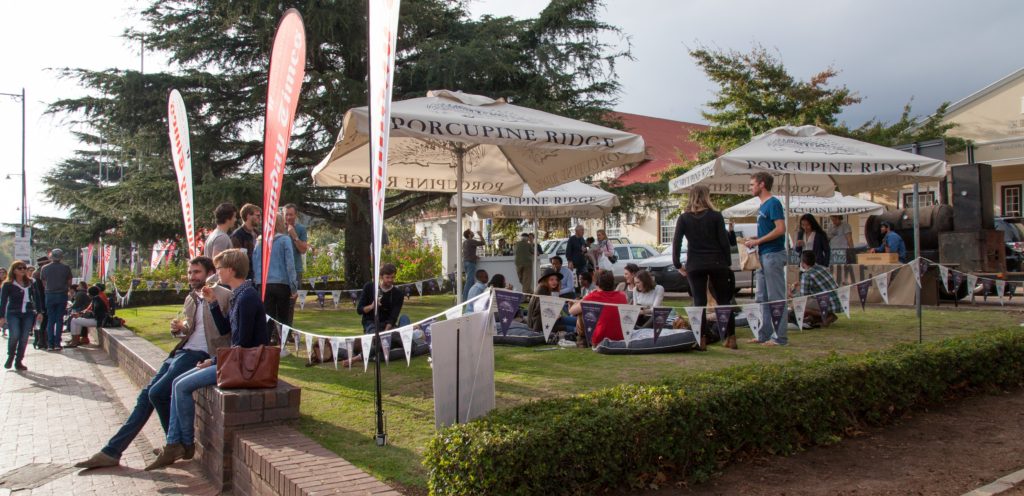
A week earlier I was imagining what my South African trip would be like, and here I am now, taking in small stories of lives drifting in and out of literary events, their stories in their eyes, or me. I wonder if they have a poem and a story in their soul if I can open them up a little.
***
I move to the first panel of the three I would be on at the festival, where the poet Karen Schimke would moderate a conversation between myself, Mbogeni Nomkonwana and Safia Elhillo on the wealth of being bi-lingual and the cultural transmission of translated poetry. I look around the room waiting for an audience to walk in. Slowly they do. We move into a deep conversation and one that makes me reflect on how significantly we have evolved from a self to multi-selves. How different it is to think in an indigenous language and prepare cultural processes and imageries in another language.
The evening is a time to read poetry without analysis to an audience enjoying a good meal of unforgettable fried fish and chips and the Essence Restaurant. Karen host few poets and there I meet Linda Kaoma, who sent me emails from Badalisha.
My next panel on the second day is just as eventful. Anxiety is no longer a company as I discuss with fellow poets, offering new perspectives and offering newer insights. ‘Speaking Up or Writing Down’ with Blaq Pearl, Isobel Dixon, and Primrose Mrwebi handling the conversation. I make a mental note to write an essay on the interactions of performance and written poetry, as the conversation rides into the idea of creation, process and audience.
It is the third day and I’m thinking how to unveil this little town. Places are meant to be discovered, and making an excuse of having little time to do that here might not be adequate. There are so many activities around and my head is swirling between moving into other discussion panels and staying for mine.
This third day, people are already making plans to leave and even one of the panellists on ‘Young Voices from Around the World’, Safia Elhillo, has to rush off to the airport. But Khadija Heeger is just as graceful, picking the consciousness of dissimilarities and similarities between the talented poets, Katleho Shoro and myself. Unlike the other days when the day’s event ended by 17:00, this one end at 14:00.
***
I walk back to the Town Hall, meet more of the festival organisers through Marla, before walking to settle bills at Exclusive Bookshop, who handled my book sales. Then I return to learn the streets of the town.
The town return to the quiet and the musing self I met it. The vibrant feet moving in and out of halls and spaces leave everywhere as it was, again, to an intimate silent. I tweet as I navigate the streets enveloped in the cascading evening sun, ‘I can hear myself breathe.’
The following day I will be in Johannesburg. The city of stories.
Johannesburg
Johannesburg is different from my Franschhoek experience. It is also very different from Cape Town. First adjustment; no hotel with a Victorian touch and stories waiting at its porch. I am in a city that breathes into the crunching aspirations of passers and inhabitants, offering what could be hope through its pulsating tempo of rush hours, dawn until dusk.
The Courtyard Rosebank is locked in Rosebank, which I learn is one of Johannesburg’s influential areas. It is central and near enough to Goethe. It meant one thing, I’d get to explore. But things are always better at home in our aspirations. Thanks to the media that molests our ability to be adventurous. At the hotel, I speak with one or two people and they ask me to be careful. News has a way of triggering fear and though I want to go to see markets, any open market. Fear is lurking… a fear I would later find is unfounded. Especially when the Head of Library and Information Services of the Goethe Institut, Sub-Saharan Africa, Brigette Doellgast, whom I would meet later for a quick meeting, with a twinkle in eyes ask me, ‘Are there no crimes in Lagos?’
At the Goethe Institut, I meet the genial Sine (who joked about her emails clogging my inbox as she planned the trip). We talk about my stay, series of programmes that have been planned as well, school visits with Niq Mhlongo which ended up at a lovely and intimate conversation with young minds at the Rosa Parks Library in Soweto with the book club manager, Thato.
Lot is with us. He is… almost-quiet type. Sine says he works as a project assistant at Goethe and offers his assistance as a ready guide when they have guests. He goes in the taxi with us to pick Niq as he did the moderating of what turns out to be a lovely and intimate conversation Niq and I was to have that day with the young minds at the Rosa Parks Library in Soweto. His questions were pertinent and useful. He queried the creative process, our favourite writers, writing in mother tongues and some other interesting things.
On our way to Soweto, we stop to pick up Niq. He emerges from the crowd, in his usual quick sprint, jumps into the car and in a flash I’m learning the history of Johannesburg as we drive past significant landmarks.
The lesson could have been more in-depth but we could not stop at many of these landmarks, so I lived in their imagination and the things I had read of them. From his story, I see how different history determines geography and becomes destiny. In Lagos, what divides us is mostly class – the mainland versus the Island. A history of colonialism, neo and gentrified, lingers in the city’s divide. As we watch the Mine Dumps that exist as rows of yellow mountains covered in shrubs and trees I conclude that for Jo’burg, the geographical division dives into the skin, sinks into the bone marrow and stands conspicuous in its geography. There are residential areas for blacks, for whites, for coloured, for Indians and the new influx of Chinese, with sprinkles of the other settlers from other countries.
Between the reading and our travelling Niq and Ahmed, the driver from Goethe, offer to take me to Soweto and we stop at the popular Vilakazi Street. First, we stop to fill our stomach at the Sakhumzi Restaurant, which is just beside Archbishop Desmond Tutu’s former residence. I enjoy the traditional buffet of lamb stew, boerewors, rice, umqa and some salad, before settling down to watch a dance performance as we eat, around mostly fascinated white tourists. We walk down to 8115 Vilakazi St Orlando West Soweto: the famous residence of South Africa’s larger-than-life former president, Nelson Mandela. There are more questions in the eyes of South Africans about identity than they share, and the unbelievable jolt of the magnificence of promise held down by fear, which contrasts its beautiful landscape.
The climax of the trip is the Literary Crossroads event at the Goethe Institut. This event is actually the one responsible for my trip and the many gallivanting around the city. Yewande Omotoso, a good friend of mine, walks in. She re-introduces me to our moderator, Ndumiso Ngcobo. He is a brilliant writer and conversationist and he bears an uncanny resemblance with the Nigerian Writer and Caine Prize winner, Rotimi Babatunde. I am meeting so many people at once and I’m tucking their faces and names into my brain. Finally, the audience settles into their seat and Ndumiso begins the day’s conversation: Quo Vadis Africa: The Power of Words, the Words of Power. I have a small conversation with Fortiscue and Nokuthula Helepi of African Flavours Books.
I meet Brigette. She does the introductions of the writers before Ngcobo begins the conversation. When the conversation is over, I look at the engaging audience, and how important it is for me to have honoured the invitation to South Africa. Again, I am reminded how talking about one’s work reminds one of why one writes. How a successful conversation is one that prods thoughts, births imagination, refines perspectives and even spills over the things that have not been given much concern. For one, this trip has done that.
***
The next day, Sine ask me over to speak with herself and Brigette. This time I study her as Sine excuses us to finish some things upstairs. Brigette and I talk about my experience, and possibilities and aspirations. We talk about genres, and about cities. I tell her my fears of moving around in Johannesburg. She smiles with her eyes, and ask if Lagos is any different. She’s calm. Her eyes and a follow-up smile study me and I feel like a book being read. Her eyes are introspective but so calm.
I spend the rest of my days in Yewande Omotoso’s house in another part of Johannesburg.
Calmly recollecting the experience and finding peace in a little catch-up reading. Her return home, is a treat of memorable stories from a Brai Night in Cynthia Jele’s house in the company of Yewande, and a few other writers. That night, I enjoyed a fill of the small unspoken consumptions of the incomplete warmth that pass on between black and white. The flash of a smile that disappears before it sits on the faces of the polite ones. I reflect quickly on Franschhoek, and I see many colours afraid of themselves. You don’t escape that one in South Africa, even when it hides from you. All of the resources are valuable for me, and even if they do not belong in this essay, it prepares a story in the future.
South Africa welcomes you with a hug and if you really feel the heartbeat, this is country you would ask as you leave: ‘Where are you going now?’
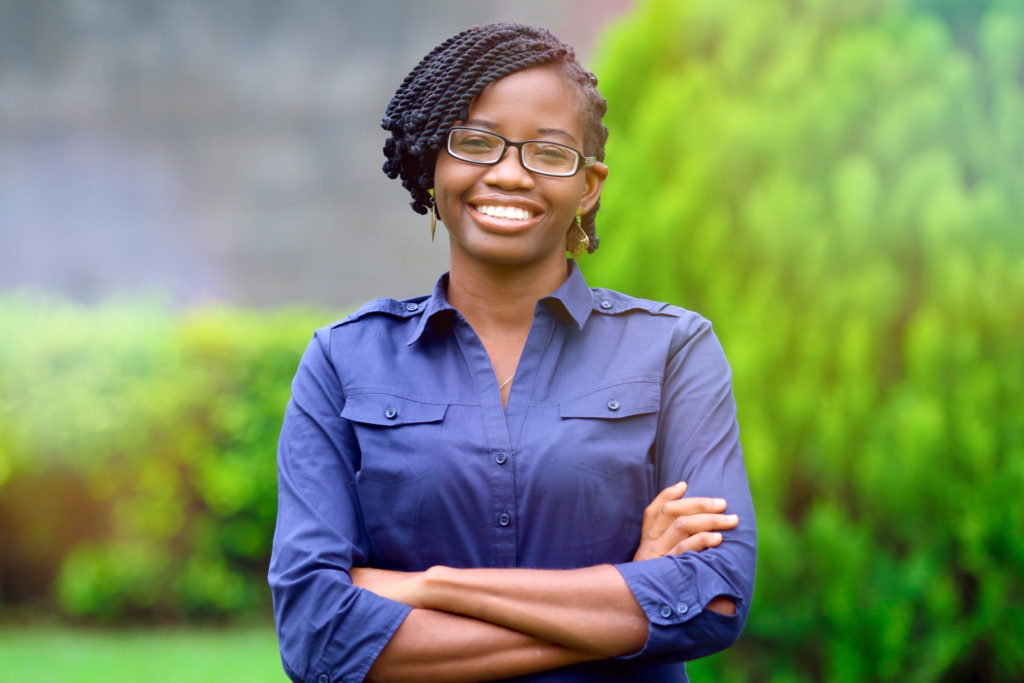 Jumoke Verissimo is the author of two books of poetry, I am memory (Dada Books, 2008) and The Birth of Illusion (Fullpoint 2015). She has contributed poems, short stories, book reviews and academic papers to many anthologies and journals. Her imaginative work explores the human condition, traumatic constructions and the intersection of gender relations as it relates to love, loss and hope.
Jumoke Verissimo is the author of two books of poetry, I am memory (Dada Books, 2008) and The Birth of Illusion (Fullpoint 2015). She has contributed poems, short stories, book reviews and academic papers to many anthologies and journals. Her imaginative work explores the human condition, traumatic constructions and the intersection of gender relations as it relates to love, loss and hope.
Cover photo credit: Franschhoek Literary Festival
